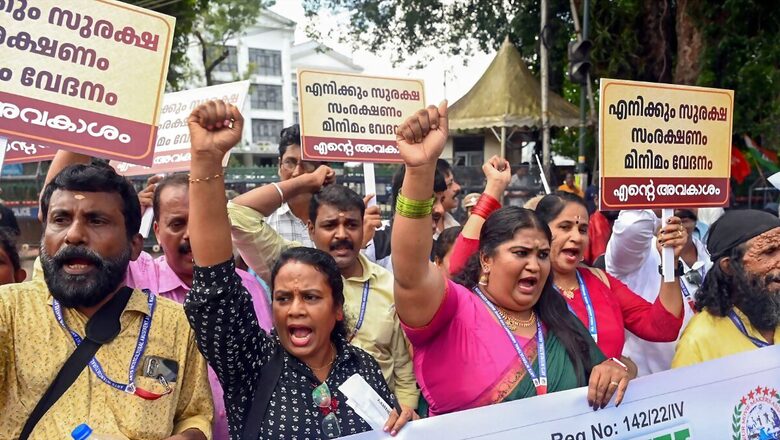
views
Often, the legal system and society at large have questioned the timing of a survivor’s actions rather than the trauma that informs those delays. The court’s rejection of this “uncharitable view” taken by Siddique’s legal team is a step towards undoing this deeply ingrained bias.
With the Hema Committee report on sexual misconduct in the Malayalam film industry now public, it is becoming clear that the delay in calling out the offender is often a result of fear, coercion, and the power dynamics that suppress voices. Many women in the industry have started to speak out about their “horrifying experiences” at the hands of senior actors.
In the Siddique case, a young actress filed a complaint against him with the Thiruvananthapuram police in August regarding an incident of alleged rape that took place around 2018. She accused him of raping her in posts mentioned in 2019, but later came forward and recorded her statement with the Hema Committee. She then filed an FIR with the Thiruvananthapuram police, which forced Siddique to step down as General Secretary of AMMA, the Association of Malayalam Movie Artistes.
The court took serious note of sweeping statements made about the matter and criticised the attack on the survivor’s delay in filing the complaint, calling it “frivolous, defamatory, and with intent to tarnish the image of the petitioner”.
The survivor in this case, where Siddique sought bail, had to endure years of trauma like many others before she could speak her truth. Her defence in court as to why his bail should be denied illustrated the brutality she faced, and her lawyer argued that Siddique should be arrested, not granted bail.
The Kerala High Court cited several Supreme Court precedents that underline the fact that a delay in reporting cannot weaken the prosecution’s case. Furthermore, the Hema Committee’s findings seem to have emboldened many victims of sexual assault, including the one in Siddique’s case.
Sharing the Supreme Court’s observations in the recent *Bilkis Yakub Rasool v. Union of India* case (2024), Judge Dias said: “A woman deserves respect, regardless of her standing in society, faith, or creed.”
Siddique is facing charges of rape and criminal intimidation. The Special Investigation Team set up to probe complaints from survivors in the Malayalam film industry, who have alleged serious offences such as rape, molestation, and mental harassment, is now searching for this senior Malayalam actor. The police have also issued a lookout notice in his name, publishing it in various Malayalam and English newspapers across Kerala, along with his photograph. Siddique has been missing since the court rejected his anticipatory bail plea on September 24.
According to the complaint by the survivor to the police commissioner, Siddique first connected with her on Facebook in 2014. Over the years, he built a rapport with her and her family, offering career support and encouraging her to join the film industry. In 2016, she attended a preview of his film ‘Sukhamayirikatte’ with her parents. This was the first time she met the accused, as detailed in the bail order. After the movie, he invited her to the Mascot Hotel for lunch to discuss a new film where his son was supposed to play the lead role, and she met him in his hotel room.
Once alone with her in his hotel room, Siddique’s behaviour turned predatory.
“The accused made the survivor sit on a chair near his bed and explained the adjustments and compromises that are expected of women to excel in the field. After that, he went near the survivor and, without her consent, grabbed her hand, pressed her fingers, and said that her nails looked good and that he loved her nail polish colour,” the court document stated.
It further describes how she was forcibly pushed and held down as inappropriate acts were perpetrated against her. The survivor was in shock, and though she tried to push the “accused” away, she was threatened and forced into submission.
“She told the accused that she would tell people about the incident. But he told her that no one would believe her, as she had no profile and her standing was zero compared to his. The survivor was shell-shocked and managed to escape from the room, completely shaken. Even after the incident, the accused attempted to contact the survivor, but she refused to respond to his calls and blocked him,” the court document said.
The trauma was so intense that the survivor could not speak about it to her parents. It was only in 2019 that she gathered the courage to speak about it on social media.
“Subsequently, the survivor received threatening messages, which prevented her from filing a complaint. The survivor has been living in immense trauma, fear, and distress and still fears for her life. Hence, urgent intervention is needed. Following the complaint, the FIR was registered against the accused,” argued the survivor’s counsel on why Siddique should be arrested and denied bail.
While applying for bail, Siddique’s lawyer alleged that there was an inordinate delay in filing the complaint, claiming that the FIR was registered eight years later, which proved the falsity and hollowness of the crime. The survivor gave no plausible explanation for the inordinate delay in lodging the complaint.
The court maintained that a delay in filing a complaint does not weaken the prosecution’s case. If there has been a delay, it is not grounds for dismissing the case, particularly when considering a bail application.
Judge CS Dias of the Kerala High Court, while rejecting Siddique’s bail application, stated that “victims of sexual abuse and assault may experience psychological, emotional, and social barriers that cause delays in reporting the matter, which must be understood in the context of the trauma. The survivor must also have gone through great turmoil, and only after serious thought would she decide to lodge the FIR”.
Stating the grounds on which bail was denied, the court said after an overall review of the facts, the nature, gravity, and seriousness of the accusations against the petitioner, along with the evidence, prima facie showed the petitioner’s involvement in the crime. The petitioner’s custodial interrogation is necessary for the proper investigation of the crime.
Siddique’s lawyer argued that the survivor had not claimed in her social media posts that the petitioner engaged in sexual intercourse, so the charge under Section 375 of the IPC did not apply. The counsel also argued that the survivor is outspoken and not hesitant to falsely accuse others, making it unlikely that she would be afraid to file a complaint against someone who misbehaved with her.
It was also argued that “the survivor has used the ‘MeToo’ hashtag, which shows that she is attempting to blackmail the petitioner”. Siddique’s lawyer further contended that the survivor repeatedly made and published defamatory posts against the petitioner in print, visual, and social media, and “the silence of the petitioner disconcerted the survivor”. They argued that the case and accusations were made only to get Siddique behind bars.
“The petitioner is a law-abiding citizen without any criminal record. He is ready to comply with any conditions set by this court and is willing to cooperate with the investigation. As the complaint is highly belated, detention and custodial interrogation of the petitioner are not required to collect evidence,” Siddique’s lawyer argued.
Siddique’s lawyers further claimed that the delay in filing the case indicated that the allegation made by the survivor was not genuine and was aimed at “maligning the image” of the actor. They also stated that the survivor “gave no plausible explanation for the inordinate delay”.
The survivor’s counsel argued that “the survivor was apprehensive for her life due to the powerful position of the petitioner, which is why she did not complain earlier. After the Justice Hema Commission report was published and many actors opened up, the survivor also gathered the courage to complain,” the bail document said.
In denying Siddique bail, Justice Dias’s reasoning was clear: the gravity of the accusations and the evidence presented. “…the petitioner’s custodial interrogation is necessary for the proper investigation of the crime, especially since his defence is a complete denial of the incident, and a potency test is to be conducted. Given the reasonable apprehension of the prosecution that the petitioner may intimidate witnesses and tamper with evidence…”
The arguments of this case also speak to the larger struggle for justice in sexual assault cases in India and the need to create a system that recognises the trauma of survivors, including the fear of being defamed, maligned, or even labelled as frivolous.




















Comments
0 comment